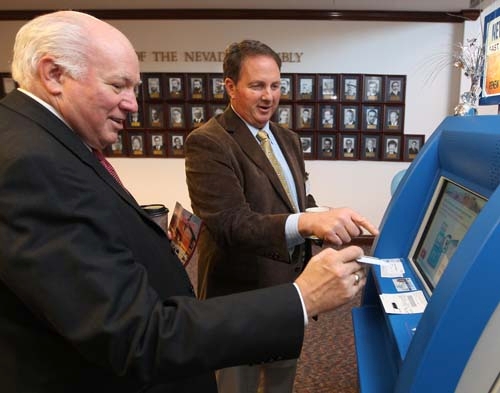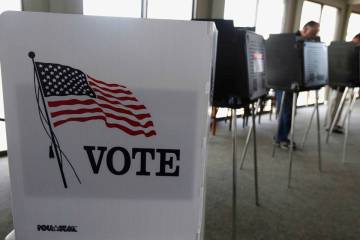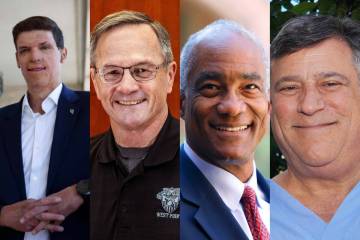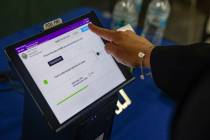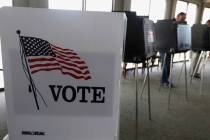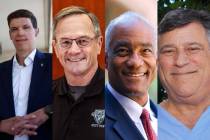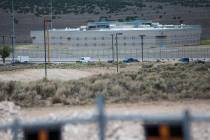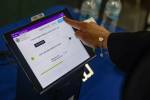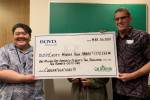Nevada DMV pitches kiosk expansion plan
CARSON CITY ---- Nevadans could spend a lot less time waiting in Department of Motor Vehicle lines, but only if a proposal to expand an automated kiosk program survives politics surrounding the state highway fund.
The state Senate Committee on Finance on Friday heard debate over Senate Bill 441, which would enable the DMV to install kiosks for car registration, driver's license renewal and other transactions at college campuses, grocery stores, convenience stores and elsewhere.
The kiosks would be similar to 26 devices already in place, but they would be funded by user fees instead of through the state's $937 million highway fund.
The shift to self funding would allow the kiosk program to expand to about 80 machines by removing it from the limits that come with DMV highway fund money.
"If they are self-funded we can do a lot of the functions we couldn't afford," DMV director Bruce Breslow told the committee.
Existing machines allow people to renew registration, get information printouts and reinstate insurance.
New machines could be expanded to cover driver's license renewals and anything the DMV allows customers to process on the Internet, DMV spokesman Tom Jacobs said.
The machines would be owned and operated by a private vendor with the fees charged directly to consumers. People who don't want to pay fees could go to the DMV and conduct business in person.
As technology improves, the machines could add upgrades such as allowing photographs and issuing licenses, Jacobs said. There's also potential to add transactions for the Department of Wildlife and other agencies that interact with the public.
"If it becomes self-funded, it opens the door to just about anything," he said.
But for the plan to move forward, backers must overcome opposition from labor union and construction industry critics.
John Madole, a lobbyist for Associated General Contractors, and Jack Mallory, a lobbyist for Southern Nevada Building and Construction Trades Council, testified against SB441 and several other DMV spending bills.
They said the DMV is spending money on computers and office equipment that should be going to road construction and repair. They suggested the kiosk fees should be high enough to make a profit for the state, as opposed to merely a pass through to the private vendor.
"The benefit to the state in the form of tax revenue is zero," Mallory said. "How much of a profit center is this for the vendor?"
The objections were part of broader criticism the union's and contractors' lobbyists have of the relationship between the DMV and the state highway fund. They argue less DMV spending means more money going into road construction and repair, which benefits their clients.
DMV funding is almost exclusively provided through the highway fund, which comes from gasoline taxes and DMV fees.
The DMV's share is limited to 22 percent of a portion of the fund, which can vary depending on economic conditions, fuel consumption and other factors.
In 2009, the highway fund raised
$937.4 million in revenue, mostly through gasoline taxes. Of that, the DMV received about $49 million. It raised another $59 million through service fees.
Mallory and Madole objected to DMV spending increasing 22 percent in recent years while overall highway fund revenue decreased 17 percent.
They criticized Breslow's proposal to spend about $3.5 million on new computers and office equipment, including about $6,000 for chairs.
"It is our opinion that this bill along with the other bills are job killers," Mallory said of about 16 DMV spending bills on the Senate Finance agenda.
Breslow said the DMV has no choice but to spend highway fund money as that is how state law funds the agency.
He added that self funding the kiosk program will save about $5 million for roads, as the existing self-service program pays vendor fees from the highway fund instead of passing them along to the customer.
Sen. Ben Kieckhefer, R-Reno, said savings from the proposed kiosk expansion minus equipment expenditures means the highway fund would have
$1.5 million more than it would without any changes and without burdening taxpayers.
"This is a convenience fee," Kieckhefer said. "The person can still get in line at the DMV and pay no convenience fee."
Still, some members of the committee appeared skeptical of the DMV bills.
"I don't think you are going to get balloons and confetti unless you are reducing some costs," said Sen. Sheila Leslie, D-Reno.
Contact reporter Benjamin Spillman at bspillman@ reviewjournal.com or 702-477-3861.



